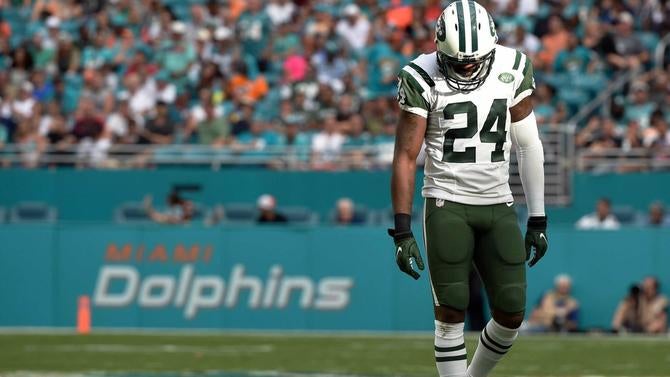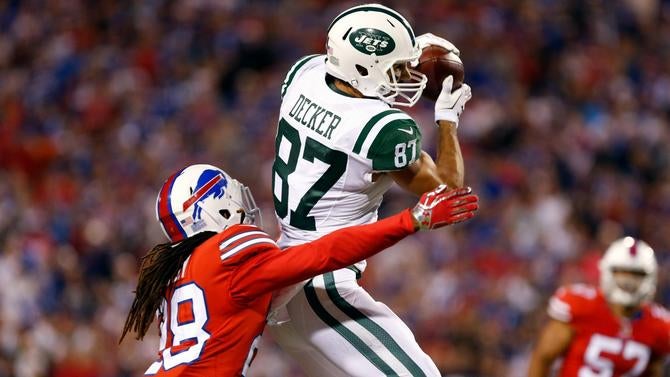The New York Jets are not tanking.
They aren't secretly hoping to lose the most games in the NFL, or flirt with 0-16. They aren't counting down the days until the 2018 draft. They aren't covertly coveting future compensatory draft picks and pretending that somehow equates to success. They won't be donning tank tops for training camp (rim shot!).
They are, most definitely, transitioning away from a veteran-heavy, middling team, to a much more youthful, cheaper roster. And it's going to be ugly and uncomfortable for a while, especially taking place in one of the world's sports and entertainment hubs. It's going to elicit plenty of hearty responses from fans and media alike. It won't be easy and it will be messy, but if done correctly it could result in a legitimate window into sustained winning by 2019. It must include the acquisition of a franchise quarterback through some means -- unless Christian Hackenberg defies the odds and makes substantial strides this season -- and it will require a new core of locker room leaders to emerge with the likes of David Harris and Nick Mangold among those exiled in this much-needed purge.
Difficult, yes. But impossible, it is not.
Before we run rampant with talk of "tanking," let's examine how the Jets got here in the first place, because context is paramount. Let's go back to January 2015, when owner Woody Johnson -- spurned by top candidates during coach and GM searches in the past and with his team reeling in the aftermath of the chasm between Rex Ryan and Mike Tannenbaum and then Rex Ryan and John Idzik -- hired rookie head coach Todd Bowles and rookie GM Mike Maccagnan.
At the time ownership was sick of the chaos and the leaks -- think Tebow running shirtless at camp and Mark Sanchez imploding after being gifted a contract extension he hadn't earned and the butt fumble; recall the untenable cap "management" and perpetual fistfights at camp; remember mounting empty seats and fan unrest and Fireman Ed boycotting home games.
Then, after a few years of being tight with his wallet, Johnson was ready to make a splash or two. The signings of the new coach and GM weren't particularly sexy -- he'd had enough of larger-than-life personas on the sidelines -- but Johnson's ambition was. It was clear to most football people that this franchise was in need of a teardown -- to part with or trade some aging talent (like Harris and Mangold), to try to find a young QB and make calculated forays into free agency.
Johnson had other ideas.
He was fed up with getting abused in the media and for letting stars get away -- corner Darrelle Revis in particular -- and reuniting with the mercurial defensive back became something of a requirement in 2015. The owner had heard enough about being overly pragmatic and too slow on the draw under embattled GM John Idzik, and he craved a very different sort of action. And he craved it rightbleepingnow.
Woody wanted Revis Island back in Jersey. Revis knew it, and the Patriots weren't going to go crazy to keep the free agent fresh off yet another Super Bowl win. But they would go deep enough into talks to result in Johnson effectively guaranteeing three years of salary (which explains Revis getting a $6 million parting gift from Gang Green this offseason when he was inevitably let go).

So, if Johnson is backing a win-at-all-costs mentality in that negotiation, for an already-then 29-year old corner, it tends to color the entire direction of the organization. If that's the mandate, and the owner has made it clear he intends to "compete" now, and with the dynastic Patriots still in the AFC East, Maccagnan and Co. have their work cut out for them. After years of poor signings and wasted draft picks by prior regimes, again, this team screamed out for a teardown, but that's incongruous with guaranteeing $32 million in salary to Revis alone for the next two seasons (and that $6 million more in 2017).
Hence, the buy-low trades on other aging players like Ryan Fitzpatrick and Brandon Marshall, and the free-agent flurry including Antonio Cromartie and Buster Skrine. But even then, if you parse through those contracts, there was complicit recognition by the new front office. All were structured so the Jets could break free -- with no brushback, save for that 2017 Revis guarantee -- within two years. If there was any real window to win with this group, it was short-lived -- a nod to the advancing age of Revis, Harris, Mangold, Marshall and D'Brickashaw Ferguson, et al. Johnson understood this as well, I'm told, as he comprehended the risks of staying old in the short term, realizing that the eventual bloodletting would be even more cumbersome in, say, 2017.
Which brings us back to the present.
Sure, Johnson's plan resulted in a 10-win season and nearly a playoff appearance in 2015, but that feels hollow now after age and injury ravaged the 2016 Jets. That delayed rebuild looks even more shortsighted today. Just don't lose sight of how they got there, and how ownership set the template for the opening salvos of the Maccagnan/Bowles regime.
If the Jets had begun going increasingly young, stockpiling draft picks and soliciting trade partners for their older core back then, no one would have questioned them. It wouldn't have been thought of as a "tank job" or waving white the flag -- just smart football sense. So, I'm going to view it through that same prism now. Has it been more awkward than it had to be, and should the Jets have just gone ahead and made the Harris and Eric Decker decisions earlier in the offseason when the original purge began? Yes. That could have been handled more adroitly.
If anything, however, maybe give this front office some credit for finally getting ownership backing for that long-needed wrecking ball to the roster. Johnson is finally embracing the fact that it may take a three-win season to eventually truly contend, rather than falling into the fool's gold trap of more 6-to-10-win seasons with teams not constructed for postseason success but with other older vets to keep from falling too far down the standings.
And, before we go any further, let's further examine what "tanking" might more reasonably constitute.

New York didn't let multiple starters depart in their prime -- guys in their mid-20s -- over a few hundred thousand dollars here or there at a time when they had an egregiously low payroll already and more cap space than they could expend in three offseasons much less one. They didn't sell out for draft picks and then ensure all 15 of them made the team -- including five at one position alone (receiver) -- and treat comp picks like they were more valuable than wins. The Jets didn't take someone who was originally brought in to be a lawyer and elevate him to head all of football operations.
They didn't undermine their one discernable strength -- offensive line -- to the point where a quarterback was getting hurt like once every three quarters the team played. They didn't shun an elite kicker midseason when a need arose to sign a minimum-salary upstart with no track record. They didn't re-hire a defensive coordinator who they had just run out of the building a few months back amid turmoil and tumult. They didn't sign RGIII and then prop him up as the Opening Day starter.
In other words, don't paint the Jets with a Brown brush.
You don't have to love what New York is doing or how they're doing it, but I'd ask you -- what other approach can they take now? Does it make any sense to cling to guys with a season -- or possibly less -- of quality football left in them given the overall nature of this roster and coming off that dreadful 5-11 campaign last year? Given the nature of the NFL salary cap, it's time to clear the deck, create more opportunity for players from the last few drafts and assess long-term needs.
It will probably result in Hackenberg starting games by midseason. Wins will be few and far between … but let's not pretend that's merely a Jets phenomenon. Ask people in Jacksonville, Cleveland, Buffalo, Los Angeles (and St. Louis), San Francisco, Chicago and Tampa (though they are certainly now on the come up) what that football looks and smells like. And, ultimately, it may result in Bowles taking the hit and being relieved before the 2018 season, though based on all of my reporting I don't foresee Maccagnan being imperiled given ownership's backing of this painfully fresh rebuild (and the GM didn't get to hire this coach in a traditional fashion, as he and Bowles were brought in more or less at the same time).
No matter what the future holds, the Jets had no recourse but to fully embrace a different path. And while mistakes have certainly been made -- letting Fitzpatrick hold them hostage in contract talks for six months last offseason was an unforced error of the highest degree -- I believe the defense will be better than some might suggest as soon as this season. And gains, for 2017, will be more accurately assessed in terms of player development than in what the standings indicate.
The Jets will undoubtedly be looking up at most teams in the AFC, but they won't be reveling in it, and I'm not sure there was any real alternative to that impending reality anyway.






















